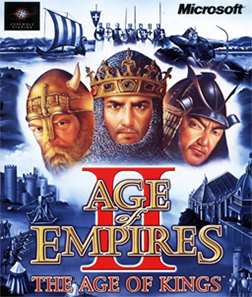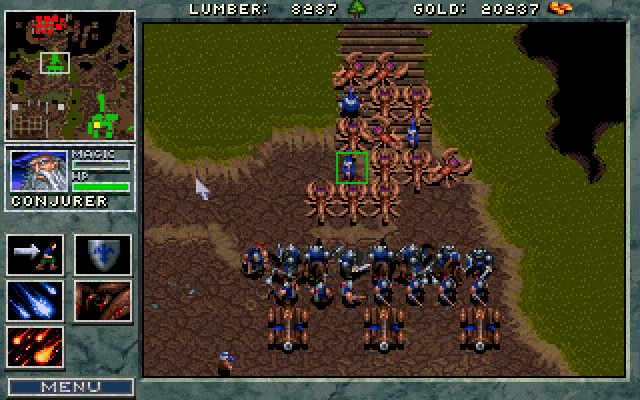Way back in strategy gaming’s past, you find this. Way back in the planet’s past, you find dinosaur shit. It’s not too pretty to look at, but we’re standing on it.
Blizzard’s 1994 “build a town and destroy the other guy’s town” game wasn’t the first, but Dune II was crummy and nearly unplayable. This is actually sort of fun. You choose a race (orc or human), then you harvest gold, build a city, train an army, win the game, type “u suck, git gud scrub” to your opponent, bribe your correctional officer so that he lets you use good shower in Cellblock D (which has hotter water and 23% fewer rapists), and wait what was I saying
The graphics are a 320×240 assault of pixels, blocky but nostalgic and charming. The audio’s pretty good. The game’s only plot is a funeral plot where Blizzard’s scriptwriter was buried after starving to death. Games in 1994 did not need stories. The game is overall simplistic but enjoyable: 90s PC gaming in a nutshell. Most people who played Warcraft back in the day enjoyed it, and some of the people who play it now will also enjoy it.
Incidentally, the orcs and humans aren’t identical mirrors of each other. You’ll see many reviews claiming that they are, and it’s a dead giveaway that the reviewer hasn’t played the game. The human archer shoots further than the orc spearman. The orc necrolyte has more range than the human priest. The differences are subtle, but you soon get a second sense for them. Unless you haven’t played the game, I guess.
The game has two crippling flaws, neither of which relate to its age.
First: you can only move four units at a time. I hate this. Commanding large armies is aneurysm-inducing. You can roughly simulate your experience playing Warcraft by filling a huge swimming pool using a 1 liter kiddie bucket.
I think Blizzard’s defense back in the day was that they didn’t want people to just spam a bunch of units and flood them at the enemy. That’s one way to solve that problem. Another would be to pay a guy to kick down my door, yank my keyboard out of the computer, and RKO it through the nearest wall. If your only answer to “degenerate user behavior” is “take away that user’s ability to play”, you do not know how to design games.
Second: nobody thought that balance between the varying units was important.
No-fail recipe for victory: choose orcs, spam archers, get warlocks, then spam demons. The only way to counter this strategy is to do it yourself, except better. There’s just no stopping demons in this game. They cost nothing, and beat everything. Yeah, they eventually run out of magic and die. Fighting them merely makes you run out of everything and die. If the game’s cover accurately reflected the balance level, the human would be bent over, taking it in the pooper.
It’s old. It’s crappy in places. Play this to see where the Warcraft series began. Unlike many supposedly classic games, it’s fairly good for what it is, not just for what it inspired. I hold considerable respect for it, which is why I’ve waited this long before helpfully pointing out that Warcraft anagrams into Warcfart.
No Comments »
 Heavy metal is a masked ball where everyone pretends to be a lunatic. No matter how excessive KISS, Black Sabbath, and Slayer, they were always willing to unmask themselves at the end of the night and admit that it was an act.
Heavy metal is a masked ball where everyone pretends to be a lunatic. No matter how excessive KISS, Black Sabbath, and Slayer, they were always willing to unmask themselves at the end of the night and admit that it was an act.
It was only a matter of time before metal attracted a band of actual lunatics who didn’t realise or care that it was supposed to be an act . Mayhem was that band. Marking their career with dead bodies and burned churches instead of gold and platinum records, the sheer spectacle of Mayhem destroyed any serious mainstream interest their music might have had. Maybe that was their goal from the start. Either way, there was no mask or pretense with the music they played and the people they were, the ugliness started at the face and went straight to the bone.
Deathcrush, released in 1987, provides a bridge between the first wave of black metal and what would eventually become its second. It retains the sloppy punk tendencies of Venom and Discharge, but spikes it with antifreeze, creating something colder and more emotionless. The guitars are trebled to a fizz that sounds like hissing bacon. The drumming could be described as “spirited”, and not the good kind of spirits, either. The percussion section thrashes and pounds wildly like a demonically possessed horse trying to gallop on three broken legs. Somewhere in this mess there’s a bass guitar. Songwriting? What is this songwriting of which you speak?
Tracks kind of blur into each other, merging amoeba-like into a continual impression of darkness and coldness. It’s certainly violent and noisy. It’s also calculated and conniving. The EP opens with an avant garde percussion piece by experimental electronica producer Conrad Schnitzler – probably to give the EP art school pretentions. “(Weird) Manheim” is more experimentation, this time on a slightly out of tune piano.
The rest of the EP is a blur of frost-rimed crust punk. The title track is fast and unrelenting, “Chainsaw Gutsfuck” is even more so, and then you almost stop noticing when one track ends and the next begins. There’s a Venom cover stuck somewhere in this anthology of musical hoar frost, pulverised into something as brutal and faceless as all the others.
Despite the EP’s 17 minute length, you’ll eventually start searching for more substance, and you will not find it. The musicianship is basic. The riffs are all interchangeable. Maniac’s yelps and shrieks soon stop being terrifying and start verging on being nearly comical, like a cat trying to yodel.
Is a dark atmosphere enough to anchor an EP as a classic? In the minds of many people, yes. For the rest of us, it’s interesting to know that at Prince Prospero’s ball, the Red Death once walked in earnest – if perhaps only for a brief time.
No Comments »
 In 1999, Ensemble Studios made a game that changed the world.
In 1999, Ensemble Studios made a game that changed the world.
Trivially, every game changes the world. Even a game programmed and left unreleased in a military bunker changes the world, insofar as there is now less free energy to make more games. But Age of Empires II did more than accelerate the universe’s incoming heat death. It gave us cause to regret it.
You don’t hear much about real-time strategy any more. I experienced the history of the genre in reverse, starting from AoE2 and working backwards through all the classics. It was like being a gaming Benjamin Button. Everything just getting crappier and crappier. Starcraft only lets you select 12 units at a time. Total Annihilation has craptastic pathfinding. Age of Empires I has a 50 unit limit and no production queuing. Warcraft II only lets you select 9 units at a time. Command and Conquer has clunky controls and rat-fecal AI. Warcraft I only lets you select 4 units at a time. Dune II only lets you select ONE unit at a time. It felt like the joke where a Jewish kid asks for five dollars, and his dad goes “Four dollars? What the hell do you want three dollars for?”
Curiously, I don’t experience the reverse experience when I play games made after Age of Empires II. There’s no sense of “wow, this is much better”. I suspect Age of Empires II was about as good as the genre ever got.
The game’s tons of fun. It takes the first Age of Empires’ “Warcraft but now you can pretend to mum and dad you’re learning about history” hook and takes it into the middle ages. Can Frankish paladins overcome Persian war elephants? Are Mongolian cavalry archers a match for Turkish artillery? Will your prepubescent opponent question your sexual orientation and your mother’s virtue? Learn these answers and more.
As a new player, your first instinct will be to haul ass to the single-player mode. General surgeon’s warning: AoE2’s singleplayer is slow, boring, repetitive, and teaches you bad habits. Spent as little time there as possible.
Play multiplayer instead. This game’s multiplayer is great, and at a certain skill level, transcends great and becomes godlike. There’s so much artistry, so much finesse, the axle of a 1vs1 turning on such pivots as a forward tower losing 10hp to an attacking villager, or someone having a position that’s slightly downhill. The game’s surprisingly almost balanced between civilisations and unit types, and various fan mods and patches scratch the word “almost” away from that description. 1vs1s are like a fencing match, full of lightning-fast action and counteraction. 4vs4s change the dynamic to something huge and Game of Thrones-esque. It almost feels like a totally different game.
But let’s be honest, these games are dark triad simulators.
Age of Empires II puts you in control of many putative human lives, but not in a way where they emotionally effect you. They’re so far away on the screen that your brain just registers them as “game pieces”. There’s no “grieving widow” meter in this game. Everyone’s just kind of cannon fodder. How careful you are in sacrificing men depends entirely on how much food, gold, and wood you have to make new ones.
In Grand Theft Auto, human beings behave like human beings. Even a primitive game like Doom puts you up close and personal to the monsters, so you can see them react in pain. But real time strategy games seem like how a sociopath views the world. I know I lasted about a week on my first Age of Empires II forum before I stopped calling my soldiers “men” and started calling them “units” like everyone else.
Potentially disturbing insights into your psych aside, Age of Empires II is an aesthetically nice game. Starcraft and Total Annihilation are set in dismal hellscapes. Age of Empires II takes place in landscapes as pretty as a travel brochure. Everything has a nice heft and sense of scale – castles tower above the landscape, galleons seem appropriately big. The game is visceral enough to break through the sociopath filter every now and then, although not always intentionally. You can control sheep, and send them on long journeys across the map. Demonic possession? And slain bodies swiftly decay into skeletons – often while other soldiers are still fighting around them. Disturbing, as if everyone is caught in a time-lapse vortex.
These days I see a bored programmer going “who gives a fuck, nobody will care about that” and punching out for the day. But back then, these little flaws in the reality of the game were kind of creepy. They seemed like they must have been planned. That’s one of the things about being a kid. Everything seems planned.
I first played this game as a child, and although I commanded a kingdom, mentally I was probably more like those villagers, who trustingly obey orders even when you make them walk in circles, or into enemy fire. These guys don’t realise that sometimes the ship’s captain is an idiot, or that sometimes the ship has a broken rudder.
Anyway, what I’m saying is that this game is pretty good.
No Comments »



